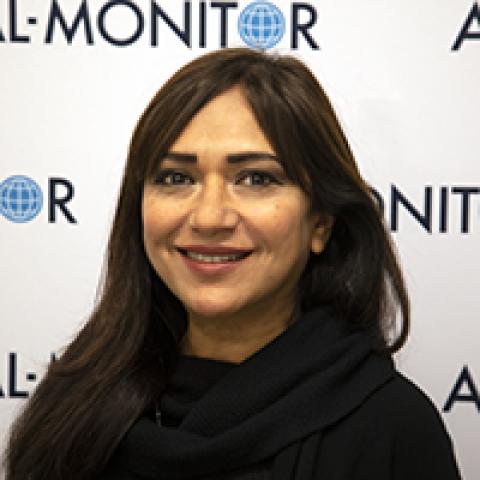The veil of mystery shrouding a March 15 helicopter crash in Iraqi Kurdistan was partially lifted Friday when the United States' top ally in the fight against the Islamic State said that nine of its fighters were killed in the accident.
The Syrian Democratic Forces (SDF) said two helicopters carrying its elite forces had crashed en route to Sulaiymaniyah, the Kurdistan region’s second-largest city. Sulaiymaniyah is the stronghold of the Patriotic Union of Kurdistan (PUK), the second most powerful party in the Kurdistan region. The Kurdistan Regional Government (KRG) said Thursday that a single helicopter had crashed in the district of Chamanke in Dohuk province.
The SDF added that the units were part of an “exchange of expertise” in the fight against the Islamic State. Among the victims was Sherwan Kobane, a nephew of the SDF’s commander in chief, Mazlum Kobane, who is also known as Mazlum Abdi.
The group also published the names and photographs of the fallen fighters, including three women. The statement, however, left one critical question unaddressed: Who did the helicopters belong to?
Kürdistan bölgesinde helikopterlerinin düşmesi sonucu yaşamını yitiren Terörle Mücadele Özel Kuvvetleri Komutanı Abdo Abdi ile birlikte seçkin güçler olan Terörle Mücadele Güçlerinden yaşamını yitirenler. pic.twitter.com/RyvW3bPuI7
— Yavuz Özcan (@OOktayyildiz3) March 17, 2023
Several well placed sources continued to point fingers at the PUK. They said the helicopters, one of which was identified as an AS350 Eurocopter, likely belonged to the PUK’s Counter Terrorism Group or CTG. However, others acknowledged that it remains unclear who the helicopters belong to. The PUK has yet to formally comment on the incident.
Coalition aircraft ferry SDF officials between Syria and Iraq on official business related to counterterrorism activities, but the helicopter did not belong to the coalition, spokesperson US Army Capt. Kevin Livingston told Al-Monitor. US Central Command has not returned a request for comment.
The SDF statement left things vague, saying its counterterrorism units had traveled to Sulaiymaniyah "within the framework of activities and efforts to combat [IS] cells" and to “exchange security and military expertise in order to enhance the combat and security level of units to continue their duties in combating terrorism and protecting the population of the regions of Northern and Eastern Syria.”
The US-led Coalition signaled its continued support Friday announcing the capture of a leading IS jihadi in a joint operation with the SDF.
Thanks to our #SDF partners, ISIS lost a key leader, an operative, and a facilitator. Our partner forces' hard work keeps the people of NE Syria safe. The @cmoc_sdf is committed to a stable NE Syria, & #Coalition continues to #AdviseAssistEnable our trusted partners. #DefeatISIS https://t.co/5Ize87h36t
— Operation Inherent Resolve (@CJTFOIR) March 17, 2023
On Thursday, the KRG’s Counter Terrorism Unit said that five of the victims were members of the outlawed Kurdistan Workers’ Party (PKK) that is at war with the Turkish military. The group’s top commanders and the bulk of its forces are based in Iraqi Kurdistan. Ankara insists that the PKK and the SDF are tightly linked and has repeatedly called on the United States to scotch its alliance with the latter on those grounds.
The SDF has demanded that KRG authorities secure swift repatriation of the victims for burial. KRG officials briefing Al-Monitor said that forensic examinations of the bodies and efforts to establish their identities were ongoing in Dohuk and once completed, that they would likely be handed over to the SDF.
In December, PUK leader Bafel Talabani made his first trip to the Syrian Kurdish entity, where he met with the SDF chief, Kobane. Kobane later revealed in a tweet that Combined Special Operations Joint Task Force Operation Inherent Resolve Commander, General Mathew W. McFarlane, was present at their meeting. Kobane’s fallen cousin, Sherwan was pictured with Talabani.
In a video he posted featuring his trip there, Talabani is seen posing for a selfie with the SDF commander-in-chief, Kobane’s fallen cousin, Sherwan. Today the PUK leader appeared before the media sporting a jacket with an SDF Counter Terrorism Unit patch on it.
On Friday Talabani posted another photo on his Facebook page showing himself with Kobane’s late cousin, offering his condolences and saying his “martyrdom” and that of his comrades had “wounded our hearts."
The Kurdistan Democratic Party of Iraq, which commands the top positions in the KRG, has frosty relations with the US-backed group and the PUK alike. For more than a year now, the KDP has barred SDF officials from transiting through Erbil, leaning towards Turkey’s assessment of their being branches of the PKK’s “terrorist” tree.







